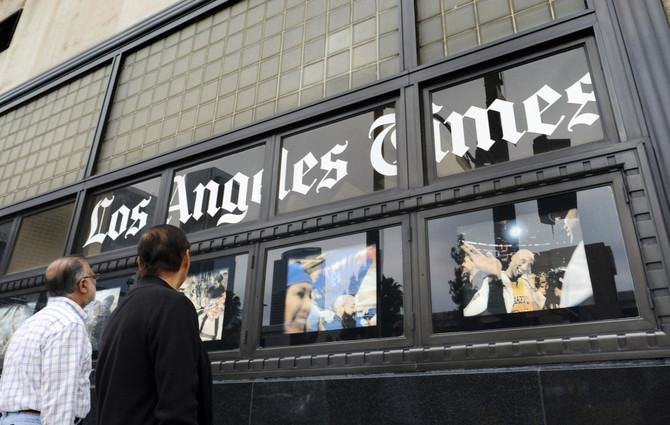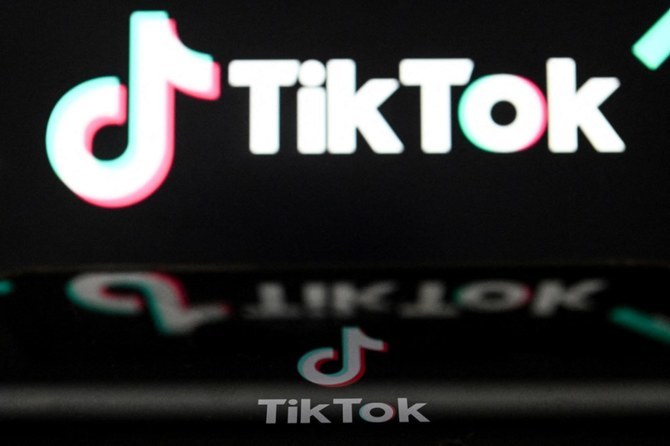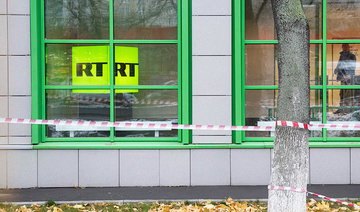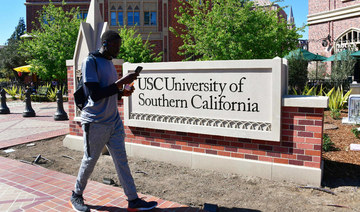LOS ANGELES: A billionaire doctor struck a $500 million deal Wednesday to buy the Los Angeles Times, ending the paper’s quarrelsome relationship with its Chicago-based corporate overseers and bringing it under local ownership for the first time in 18 years.
The agreement between Los Angeles-based medical entrepreneur Dr. Patrick Soon-Shiong and Tronc Inc. marks the latest instance of a rich, civic-minded individual buying a newspaper from a big corporation.
Soon-Shiong is a major shareholder of Chicago’s Tronc Inc., one of the richest men in Los Angeles and, according to Forbes, the nation’s wealthiest doctor, with a net worth of $7.8 billion.
The deal includes The San Diego Union-Tribune, various titles in the California News Group and the assumption of $90 million in pension liabilities.
Soon-Shiong takes over in a time of turmoil at the paper. The Times just replaced its top editor, the third switch at the position in the newsroom in six months. Publisher Ross Levinsohn had been on unpaid leave after revelations that he was a defendant in two sexual harassment lawsuits elsewhere. Tronc announced Wednesday that Levinsohn has been cleared of any wrongdoing and would be reinstated as CEO of its newly reorganized Tribune Interactive division.
Journalists voted last month to unionize for the first time in the paper’s 136-year history.
Clashes between the Los Angeles Times and Tribune Co., which changed its name to Tronc Inc., erupted not long after it acquired the West Coast paper in 2000. Staff at the Times bristled over what it considered a string of bad decisions made from hundreds of miles away in Chicago. Tronc owns the Chicago Tribune.
The editor of the Los Angeles Times, John Carroll, who led the paper to 13 Pulitzer Prizes, resigned under heavy pressure to cut staff. Before he left, he asked an old friend and billionaire philanthropist if he would consider buying the paper.
Publisher John Puerner stepped down at the Times, as did his successor, Jeffrey Johnson, shortly after.
Dean Baquet, who took over for Carroll, left after 15 months. He is now the executive editor at The New York Times.
The sale of the Los Angeles Times is in keeping with one of two trends in media ownership: big companies getting bigger and wealthy investors taking on newspapers as philanthropic endeavors, said Al Tompkins, a senior faculty member at the Poynter Institute.
In 2013, Amazon founder and CEO Jeff Bezos bought The Washington Post for $250 million. Boston Red Sox owner John Henry bought The Boston Globe for $70 million.
“We find ourselves returning to where we were a century ago when a handful of wealthy owners controlled big influential newspapers,” Tompkins said. “Here’s the difference: The ownership today does not promise lucrative returns. You take it over knowing it isn’t nearly as profitable as it might have been 20 or 50 years ago. Today it’s a thinner margin and it gets thinner every day.”
Soon-Shiong also holds a minority interest in the Los Angeles Lakers, acquired in 2011 from Magic Johnson, the team’s former superstar and current president of basketball operations.
In an interview with the Times last year, Soon-Shiong acknowledged that as a major stockholder, he was unhappy with the way the Los Angeles Times was being run and felt a need to ensure its survival.
“I am concerned there are other agendas, independent of the newspaper’s needs or the fiduciary obligations to the viability of the organization,” he said at the time. “My goal is to try and preserve the integrity and the viability of the newspaper.”
After The Washington Post first reported a potential sale Tuesday, cheers spread through the Times newsroom.
Tronc said the deal will allow it to follow a more aggressive growth strategy focused on news and digital media. Acquisitions will continue to be a big part of its plan, Tronc said Wednesday, and the company announced that it’s buying a majority stake in online product review company BestReviews for an undisclosed amount.
The sale comes about a week after veteran Chicago journalist Jim Kirk was named editor in chief to replace Lewis D’Vorkin, whose short tenure was marked by clashes with staff.
Kirk, 52, had briefly served in the job during a management overhaul from August until November, when D’Vorkin joined the paper. D’Vorkin will stay on with Tronc as Chief Content Officer of Tribune Interactive, the company said Wednesday.
Reporters at the Times were alarmed by recent hiring of several news executives who reported to business executives, and not to news editors. That sparked fears the business side would wield undue influence in editorial matters. Traditionally, the editorial and business sides of a paper work separately to maintain journalistic credibility.
A return to local ownership would restore pride at the Times, said veteran media business analyst Ken Doctor.
The question is whether a new owner will do more than halt cutbacks by reinvesting, as Bezos and Henry did at their newspapers, to set the Times on a new path.
“Given the huge challenges still faced by news publishing in the age of Google/Facebook ad duopoly and still-onrushing digital disruption, even a billionaire has his work cut out for him,” Doctor said.
Los Angeles Times sold to local billionaire for $500 million
Los Angeles Times sold to local billionaire for $500 million

TikTok CEO to fight US ban law

WASHINGTON: TikTok’s chief executive said on Wednesday that the company expects to win a legal challenge to block legislation signed into law by US President Joe Biden that he said would ban the popular short video app used by 170 million Americans.
“Rest assured — we aren’t going anywhere,” CEO Shou Zi Chew said in a video posted moments after Biden signed the bill that gives China-based ByteDance 270 days to divest TikTok’s US assets or face a ban. “The facts and the Constitution are on our side and we expect to prevail again.”
Biden’s signing sets a Jan. 19 deadline for a sale — one day before his term is set to expire — but he could extend the deadline by three months if he determines ByteDance is making progress. Biden is seeking a second term against former President Donald Trump.
In 2020, Trump was blocked by the courts in his bid to ban TikTok and Chinese-owned WeChat, a unit of Tencent, in the United States.
Chew added: “Make no mistake — this is a ban on TikTok.” He emphasized that TikTok would continue to operate as the company challenges the restrictions.
Driven by widespread worries among US lawmakers that China could access Americans’ data or surveil them with the app, the bill was overwhelmingly passed late on Tuesday by the US Senate. The US House of Representatives approved it on Saturday.
The four-year battle over TikTok is a significant front in a war over the internet and technology between Washington and Beijing. Last week, Apple said China had ordered it to remove Meta Platforms’ WhatsApp and Threads from its App Store in China over Chinese national security concerns.
TikTok is set to challenge the bill on First Amendment grounds and TikTok users are also expected to again take legal action. A US judge in Montana in November blocked a state ban on TikTok, citing free-speech grounds.
The American Civil Liberties Union said banning or requiring divestiture of TikTok would “set an alarming global precedent for excessive government control over social media platforms.”
However, the new legislation is likely to give the Biden administration a stronger legal footing to ban TikTok if ByteDance fails to divest the app, experts say.
If ByteDance failed to divest TikTok, app stores operated by Apple, Alphabet’s Google and others could not legally offer TikTok or provide web hosting services to ByteDance-controlled applications or TikTok’s website.
The bill would also give the White House new tools to ban or force the sale of other foreign-owned apps it deems to be security threats.
Democratic Senator Ron Wyden said he was concerned the bill “provides broad authority that could be abused by a future administration to violate Americans’ First Amendment rights.”
Republican presidential candidate Donald Trump said on Monday that President Joe Biden was “pushing” for a ban on TikTok and would be the one responsible if a ban were imposed, urging voters to take notice.
Biden’s re-election campaign plans to continue using TikTok, a campaign official said on Wednesday. Trump’s campaign has not joined TikTok.
Biden signed legislation in late 2022 that barred US government employees from using TikTok on government phones.
Advertising network MCN launches influencer practice in Mideast

DUBAI: Regional advertising group Middle East Communications Network has launched a dedicated influencer practice in the Middle East, North Africa and Turkiye to help clients across the group’s agencies, including FP7McCann, MullenLowe, UM, and Weber Shandwick.
Rami Gholmieh has been appointed to lead the practice as the regional director of influencer marketing, while Razan Zahra will serve as director of influencer relations.
“At the heart of our influence practice lies a commitment to two fundamental principles: effectiveness and efficiency,” Gholmieh told Arab News.
“The challenge lies in creating balance between leveraging channels to encourage content sharing and investing into paid promotions. Ultimately it requires a nuanced approach, tailored to the specific objectives and audience dynamics of respective brands.”
The practice takes a “de-siloed” approach to help agency brands across the group deliver influencer marketing campaigns, according to MCN.

The influencer marketing industry is rapidly growing, with 76.9 percent of marketers saying influencer marketing is a top priority, and 46.2 percent increasing budgets last year, according to a 2023 survey.
The growth and evolution of the industry is partly the reason why MCN chose to launch a dedicated practice now despite influencer marketing having been around for years.
With “the evolving dynamics of consumer engagement and brand interactions combined with new platforms and changing consumption patterns, a dedicated and fully integrated practice within the broader ecosystem is required to create tailor-made solutions for our clients,” the company said.
As the digital and social media landscape becomes more complex, MCN’s influencer practice aims to help brands by “understanding the social voice, (acquiring) knowledge of real-time cultural insights, (and) possessing platform expertise, the ability to co-create, and journey awareness,” concluded Gholmieh.
Eurovision Song Contest host Sweden braces for anti-Israel protests

- Event organizer European Broadcasting Union has resisted calls for Israel to be excluded due to its war in Gaza
- Contest will take place in Malmo from 7-11 May and is expected to draw 100,000 visitors
MALMO: Sweden said it plans to host a dazzling Eurovision Song Contest, watched by 200 million people worldwide, but visitors face heightened security amid planned protests over Israel’s participation and a new geo-political backdrop since Sweden joined NATO.
The contest, the world’s biggest of its kind, takes place in Malmo from 7-11 May and is expected to draw 100,000 visitors to Sweden’s third-largest city which has a large Muslim population. Organizers plan a special tribute to Swedish pop group ABBA, who won Eurovision 50 years ago this year. The European Broadcasting Union (EBU), which organizes the contest, has resisted calls for Israel to be excluded due to its war in Gaza. Controversy over the conflict has already hit various cultural events across Europe. Much focus is expected to be on Israeli contestant Eden Golan and her song Hurricane, as multiple large pro-Palestinian protests are planned outside the venue in Malmo. Israel was permitted to compete after it agreed to modify the lyrics of its original song “October Rain” which the EBU said made reference to the Oct. 7 Hamas onslaught in Israel.
EBU brands Eurovision a non-political event and insists that the contest is between public service broadcasters, not governments.
Still, it banned Russian in 2022 from Eurovision after several European public broadcasters called for the country to be expelled following its invasion of Ukraine.
Sweden is hosting the annual competition for the seventh time, after Swedish singer Loreen won last year’s competition in Liverpool with her song “Tattoo.”
Ebba Adielsson, executive Eurovision producer from Swedish broadcaster SVT, promised “some smashing shows.” She ruled out an ABBA reunion but said the event would celebrate the group’s 1974 win with their song “Waterloo,” a victory that launched the band onto the international stage.
Swiss contestant Nemo is the favorite to win this year, according to bookmakers, followed by Croatia’s Baby Lasagna, Joost Klein of the Netherlands, and Italy’s Angelina Mango.
’HIGH THREAT-LEVEL’
Visitors from 89 countries expected in Malmo will have to pass through airport-like security checks when entering venues around the city.
“There’s a high threat level combined with a lot of people,” said Per-Erik Ebbestahl, Malmo’s security director.
Organizers face the risk of protests escalating into violence, heightened terror threats in the country, and increased tensions with Russia after Sweden’s NATO membership.
In central Malmo there are official posters for Eurovision but also protest banners replicating the same colorful design, with the word Eurovision replaced by ‘genocide’ and the words: “Israel out of Eurovision or Eurovision out of Malmo.”
Orwa Kadoura, a Palestinian living in Malmo and one of the organizers of the protests, said the Israeli delegation was “here to represent Israel and their government, which is committing acts of genocide right now.”
Israel rejects any accusation of genocide in Gaza during its war against Hamas.
Police say security will be tighter compared with when Sweden last hosted the event in 2016.
“The situation around the world is complex, and also the security for Sweden is different,” said Petra Stenkula, Malmo police chief. “We are ready for anything that can happen.”
Sweden joined NATO in March, two years after Russia’s invasion of Ukraine forced it to rethink its national security policy. Russia has threatened to take unspecified “political and military-technical counter-measures” in response.
Gang crime in Sweden’s biggest cities, including Malmo, has also been a problem for years, fueled by the drug trade.
Eurovision begins on May 7 with the first semifinal, followed by a second semifinal two days later and the final on Sat. May 11.
Sky News report reveals Israel’s involvement in mass grave in Gaza

- Evidence suggests IDF bulldozed graves after taking control
LONDON: An investigation by Sky News suggests Israel is likely responsible for the mass grave discovered at a hospital in Gaza’s southern city of Khan Younis over the weekend.
Local authorities reported uncovering 283 bodies in the mass grave within the courtyard of Nasser Hospital after the Israel Defense Forces withdrew from the area on April 7.
Israel’s military dismissed claims of burying bodies there as “baseless” but confirmed that it had “examined” some bodies during a two-week operation at the hospital.
Analysis of satellite imagery and social media indicates that Palestinians buried their dead in mass graves during Israel’s siege of Nasser Hospital and that the IDF bulldozed these graves after taking control.
Prior to the Israeli army’s takeover of the hospital compound in its full-scale operation in February, staff had been forced to bury hundreds of bodies in makeshift graves near the hospital’s main building due to the impossibility of reaching nearby cemeteries.
The IDF began exhuming and examining bodies buried in the compound based on intelligence sources indicating the presence of bodies belonging to Israeli hostages.
The army said the examination “was carried out respectfully while maintaining the dignity of the deceased.
“Bodies examined, which did not belong to Israeli hostages, were returned to their place,” the IDF added.
However, Sky News’ Data and Forensic team discovered evidence indicating extensive damage to the sites caused by the army’s examination.
Footage uploaded a few days after the IDF left Nasser Hospital showed significant destruction at the southeastern corner of the complex, where some of the mass graves had been dug.
Another video revealed that bulldozer operations in the area caused an arm to be visible, partially buried in a mound of earth.
Satellite images confirmed that the damage occurred while Israeli forces were occupying the complex between Feb. 15 and 22.
The UN’s human rights chief expressed horror at the discovery and announced an investigation into claims that some of the bodies had their hands bound and were stripped of clothing.
Earlier last week, other mass graves were found at Al-Shifa, the largest medical facility in the coastal enclave.
The discovery led the Hamas-run government to accuse Israel of digging the graves “to hide its crimes.”
Since the conflict began, with retaliatory acts toward Hamas fighters killing and kidnapping 1,200 Israelis, Tel Aviv has launched a bloody, full-scale operation into the Gaza Strip that has resulted in the deaths of over 34,000 people, mostly women and children.
US police arrest Jadaliyya co-editor Sinan Antoon during pro-Gaza demonstration at New York University

- Antoon was arrested along with other NYU faculty members while attempting to protect demonstrating students from the police
- NYU students were calling for a ceasefire in Palestine's Gaza Strip
LONDON: US police officers on Monday arrested Sinan Antoon, the co-editor of Jadaliyya magazine, during a pro-Gaza demonstration at New York University in Manhattan.
The Arab Studies Institute publication announced in a post on X that Antoon, an associate professor at NYU, was arrested with other faculty members while trying to protect protesting students, who were reportedly calling for a ceasefire in the Gaza Strip.
BREAKING: NYPD arrested Jadaliyya Co-Editor and NYU Associate Professor Sinan Antoon along with other faculty and students as he/they was/were trying to protect NYU students from the Police. We will not ever be silenced.
— Jadaliyya (@jadaliyya) April 23, 2024
Antoon is an Iraqi-American poet, novelist, literary translator and academic. He was born and raised in Baghdad before moving to the US after the 1991 Gulf War.
The Israeli onslaught on the besieged enclave has since Oct. 7 killed at least 34,000 Palestinians, displaced some 1.9 million, and injured more than 75,800 people, according to Gaza’s health authority.
Confirming Jadaliyya’s announcement, human rights attorney Noura Erakat wrote on X: “NYPD is arresting faculty on their campuses for protecting their students.
“The academy is imbricated with the state and the military industry intent on war in blatant abrogation of its mission and any semblance of independence. What a gross betrayal.”
NYPD is arresting faculty on their campuses for protecting their students.
— Noura Erakat (@4noura) April 23, 2024
The academy is imbricated w the state & the military industry intent on war in blatant abrogation of its mission & any semblance of independence. What a gross betrayal. #Gaza #Genocide #Nakba https://t.co/f0tnYhHnNt
On Monday, officers from the New York Police Department moved in on NYU demonstrators after a deadline expired for people to clear an area of the campus, the Financial Times reported.
This came hours after New York’s Columbia University, where more than 100 people were arrested last week, announced it would switch to online classes in an attempt to defuse pro-Palestine protests.
The arrests at the NYU campus are part of a string of US police clampdowns on university students across the country protesting against the war on Gaza.
Local authorities claimed the clampdowns came amid scrutiny over “antisemitism” on US university campuses.
US police also arrested at least 47 pro-Gaza demonstrators at Yale University in New Haven, Connecticut.
The Columbia University clampdown, the first of its kind in three decades, triggered protests on other US campuses, including at Brown University, Berkeley, Princeton, Northwestern, Massachusetts Institute of Technology, and Emerson College in Boston.
In addition to calling for a ceasefire in Gaza, the protesting students also reportedly called for divestment of the university’s funds from companies linked to Israel.






















